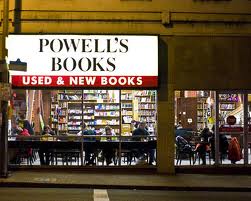I am currently in Portland/Vancouver and this morning I took a walk around downtown Vancouver Washington. Both bookstores I was looking for, are now shut up and gone. I shall simply have to hope to get to Powell’s in Portland sometime later this week.
I also received the news recently that Cokesbury is closing up ALL its vast array of actual bookstores. Of course before this Borders whole chain went belly up. This has put seminaries like Fuller and Asbury and numerous official UM seminaries into a pickle, not to mention a flurry of activity.
If we are to ask what is it that is killing off bookstores, the answer is obvious and clear as the shine on your computer screen. Computers and the Internet, and the sheer convenience of shopping at home by computer have been steadily killing off bookstores. Not only so, but last year, for the first time, Amazon announced that it had more digital book sales than hard copy sales. The times they are a changing, and not entirely for the better. Why not?
In the first place bookstores, like record stores, were places where you could go and actually examine the goods at length, ask advice from a knowledgable bibliophile about what was good to read, say in the category of mystery novels. Have a cup of coffee and sample a few actual books. Perhaps buy a used one. And all manner of things would be well for the book lover.
Disembodied books have the same problems as disembodied education in general. It doesn’t involve ethos, or real contact with actual other human beings in person. It doesn’t involve incarnational presence. It doesn’t involve a social dimension, say consulting your favorite owner of a book shop and building a friendship over the years. In short, it is a more gnostic approach to reading, learning, knowledge.
And then of course there is the further problem of not being able to trust the ridiculously hyperbolic reviews of books on Amazon and other sites, written by people who are hardly literateurs, or theologues, or experts in that particular kind of book. It is amazing to me how many people will simply buy a book online because it had a five star rating— but by whom, and why, and do you know whether or not any of the reviewers are even competent to do such a review? It may be an example of vox populi, but it is hardly as omniscient or helpful as vox dei, or at least the voice of an expert. Sometimes when a book becomes a best seller, it simply reflects the pathetic and trashy tastes of far too many Americans.
I saw this trend coming some years ago. It is why I went ahead and sold my library to Gordon-Conwell Charlotte. The actual value of good theological libraries if we are talking about hardcover books is on the decline due to digitizing of everything possible. We even had a segment of a recent faculty meeting at Asbury where authors like myself and Bill Arnold and Ken Collins and Craig Keener were asked if they would allow all or a lot of their works to be digitized for free use. Of course the answer was no way, because of copyright issues. Publishers are not about to give the whole store away for free, nor should they. Besides, it is a Biblical principle that a workman is worthy of his hire. Knowledge may be getting cheaper in the Internet and digital age, but it is also being cheapened in the process.
What I mean by that last sentence is, that I have to regularly tell students that you cannot trust a great deal of the stuff that is free on the Internet. Some of it you can, but you have to be able to critically evaluate which is which. And most students are not capable without help of doing so. There is usually a good reason why a book is free on the Internet somewhere: 1) it is out of print; 2) it is so old it is in the public domain anyway; 3) it is crap. What you will not get for free on the Internet in 98% of the cases is cutting edge good critical up to date scholarship on some subject.
So, all of this is a simple plea— let us not leave behind altogether the bookstore or real tangible books. We should not do this anymore than we should leave behind real face to face live education with full ethos and incarnational presence and personal interaction. The less personal education becomes, the less it is like the discipleship the earliest Christians received all the time.















